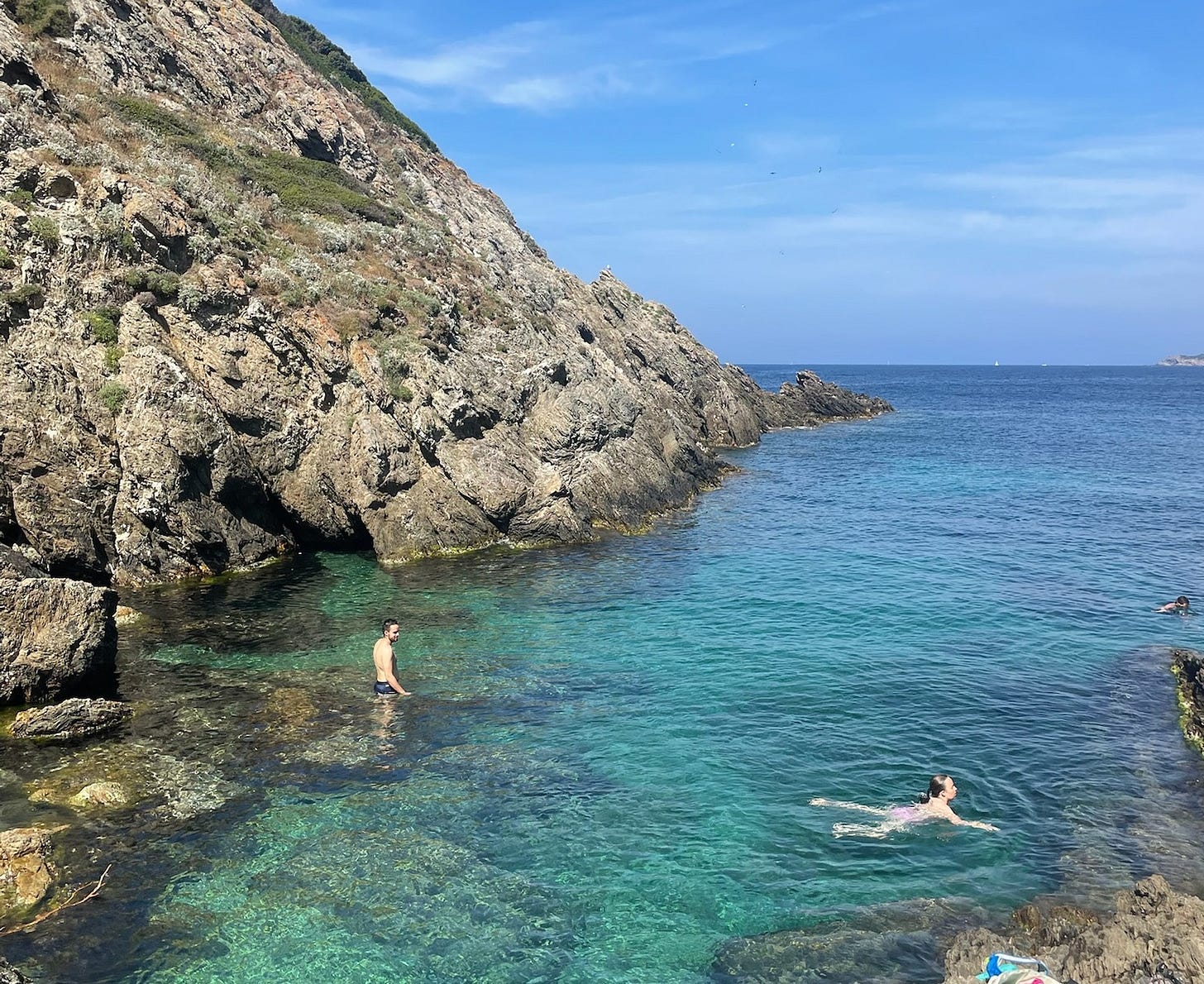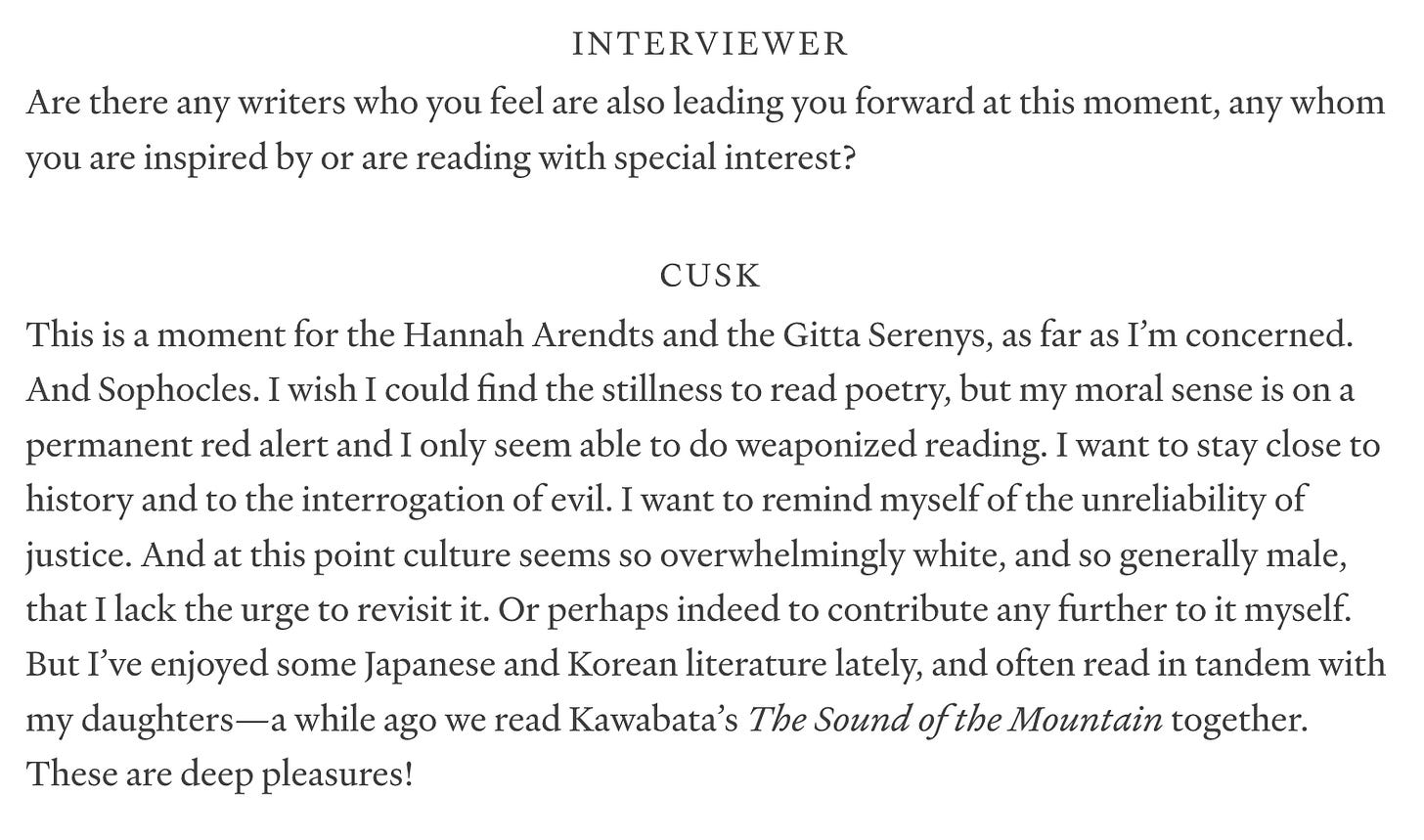What I was up to last week.
why is it so good to sit in the sun and so bad to not?
Thanks for taking the time to open this email! If you somehow were sent it and you haven’t subscribed, I’d love to have you on the email list—I try to not be annoying and then of course you can always tell me I’m annoying and unsubscribe any time you want.
In any case, if you enjoy this post, giving it a ♡ and/or commenting is helpful. It tells Substack I’m worth reading and it tells me what you think about my writing (especially if you comment and tell me what you think about my writing).
Some lessons I’m taking from hot days in France.
I’m back from my vacation and feeling a lot better. The world is pretty bad right now, but last week I was reminded that if you’re feeling lost or at a dead end it’s helpful to take a second, sit down, and shut up. Once you do that, you have a better chance of hearing whatever messages you might need to hear to get yourself out of the pit. At the risk of sounding like a self-help book (I am almost always running this risk): it is very challenging to help other people when you haven’t helped yourself.
I want to immediately take that last bit back, or at least edit it. For the same reason that I’ll rag on self-help books even though a lot of the ideas I play with unquestionably at least “rhyme” with all that mess, I’m skeptical of the idea that your cup needs to be full before you help other people fill their cup. I’m also skeptical of the idea that we ought to be concerned about our cups being full while the U.S. conducts a paupercide at home and enables Israel’s genocide in the Palestine.
Sometimes it’s necessary, even when you’re not at your best, to help the people around you. There are endless caveats we could list here, but, simply: the extremes on either end are pretty much useless. If you’re ignoring the needs of those around you because you need to prioritize “self-care,” you’re an asshole, and if you’re running yourself ragged trying to fix everyone’s problems then you’re a rube. Even more embarrassing if that “running yourself ragged” is happening inside your own head in the form of anxiety-fueled doomscrolling.
Back to my post-vacation glow. I realize now that a large part of where I’d been neglecting myself was in my media intake. It’s concerning how easy it is to slide into a place where I’ve got background podcasts and “content” running at all hours, blowing out my corneas with the light of up to four screens simultaneously, and calling myself a success story because I manage a meager thirty minutes of reading a day. This is not the behavior of a success story. Instead, think of me as a cautionary tale, a tale of a boy who thinks he’s in a summertime depression when he really just needs to practice a little bit of mental hygiene. Reading more helped. Hours of sitting in the water under a scorching sun didn’t hurt either. Neither did the time cooking for and being cooked for by friends.
Reading
I always say when I’ve let myself read for several hours at one time that it feels like I’ve flushed out the folds in my brain, rinsing away debris. All my moving parts move like they’re supposed to and I can breathe better. Like I’ve finally washed the stack of dishes that I let collect in my kitchen sink for two weeks. And yet I constantly forget this.
Last week I read three books (one was a short collection of essays). I read Another Country by James Baldwin, To the friend who did not save my life by Hervé Guibert, and Hold Everything Dear by John Berger. I’d read two books by Baldwin prior to this and knew cursorily who Berger was and about Ways of Seeing—I’m pretty sure I’ve pulled quotes from it though I haven’t read it all the way through and digested his approach and style before. Guibert was someone I’d tried to read before I moved to Philly, after I bought my copy of this book at Giovanni’s Room (the store, not the Baldwin novel). These three books worked together surprisingly well and having a week to do nothing much more than read them was a gift.
Baldwin, as usual, writes about love and hate better than anyone I have ever read. I’m floored by his ability to create character and use language the way he does without sounding pretentious or overwrought. Maybe it’s because the pretentious and overwrought writing I’m thinking of is from people who are trying to copy Baldwin. His characters are in cycles of love and hate, drawn to exactly the wrong people but unable to do anything about it.
Guibert on the other hand writes mostly about himself and only superficially about his loves, with a few notable exceptions. It’s not to say it’s an aromantic or asexual story—it’s loaded with romance and sex, actually. But he sits firmly within his own perspective, giving you insight into the moments he wishes the very worst things on other people, even people he loves. I wonder about his bravery writing that book if he hadn’t known before it went to the publisher that he was most likely going to be dead within a matter of years, killed by complications from the AIDs virus and the inaction of the world (as well as the inaction of the titular friend, a man named Bill who makes promises he can’t keep). Whether he’d have done it regardless (I think he would have) is sort of beside the point.
Hold Everything Dear is a very different book, a collection of essays and short pieces about injustice, mostly as it pertains to the Iraq invasion and the plight of Palestine under occupation. It was good to read leading up to the 4th of July, a holiday I’d never really cared about growing up but that has become more significant (not important or beloved) as I’ve aged.
The way July 4th marks a point in the summer, especially after the winter we just toiled through, feels good. I guess we could celebrate the summer itself instead, reconnect with a time when we paid better attention to the seasons, but I don’t think turning a blind eye to the United States and its rituals is all that sound of a strategy. Better to deal with it in some way. This is a thread through Berger’s writing, an expectation that there’s room for anyone to reconnect with their humanity, but a dedication to the reality that it can’t be done in bad faith. He makes the case in several places that you can’t have it both ways. You can’t be supreme and know what it is to live with others. You can’t be the conqueror and connect with the conquered. Your prior commitments have to go before you make any new ones.
Across the three books I was maybe most blown away by their wide swings. Three different but confident writers. Baldwin wrote a capital-N novel, Guibert wrote a memoir that was not, and Berger’s essays vary in form, tense, tone, and direction, sometimes within one essay. In my being stuck writing, a big part of it has come from the planning and the expectation. Thinking in terms of “this writing should do X” rather than asking “what can be done with this writing?” It’s boring to have to hear what someone thinks about writing unless you’ve asked, so I won’t go too far down that road, but I’m excited and refreshed by that reframe. What can be done with this writing?
Sitting in the Scorching Sun
It was also exceedingly good for me to sit in the sun so many hours of the day last week. It was hot, but generally not too hot, more moderate than Philly was under the heat dome at least. And it was bright, but not too bright. With a hat and sunglasses and many, many layers of sunscreen I was able to bake without burning. I haven’t done that in a long time, not just because of the aforementioned shitty winter, but also because I haven’t quite figured out swimming and outdoor time during Philly summers. Last summer got overtaken by unexpected losses and a new niece—both deserving of the time and attention, to be clear. But wow I’d forgotten how much I need to feel the sun.
Every person who has lived north of the sunbelt who’s reading this is rolling their eyes, which I accept. This is my first time living somewhere seasonal and aside from the off kilter extremities of climate change, I wouldn’t change anything. After so much time last week sweating outside, shedding something other than salt and water, I’m connecting at another level with the idea of an ensouled world. A reach? I don’t think so. The sun is alive, the air is alive, the plants baking right alongside me are alive. The ocean and the rocks are alive. The lizard that’s perfected his ability to match the pace of the sun’s heat is more than alive, he’s a master of life. Maybe my brain is just fried, but if it is then I’ll be doing whatever I need to do to keep it fried. I feel better.
Cooking with Friends
The first year my friends and I took a summer reunion trip to France, we cooked our meals mostly to save money. We’d already dipped pretty deep into our budgets to get there and have a place to stay with a pool (a non-negotiable for all of us, more important than the rare AC unit in France), so cooking just made sense. We ate well that trip, but something evolved between that summer and this one without our forcing it. Each day built up to dinnertime. We worked in pairs, organized our meals and planned our shopping trips, considering cost but mostly considering flavor and experience. It wasn’t fancy, but it was thoughtful.
We ate pizza with fresh dough, roasted vegetables with herbs from the garden, enjoyed homemade hummus, fatayer, and other Palestinian dishes. Somehow by the third day we’d all decided dinner should end with a dessert, anything from Coke floats to fresh tarts or tiramisu. Matt joked that cinnamon rolls would be good for breakfast and I pointed out that we had all the ingredients since they were already making pizza dough. So I made cinnamon rolls. We ate well.
I live alone and cook for one. Frequently I’ll find myself shoveling down a handful of spinach, some cold cuts, and a piece of bread rather than making a meal. It feels like there’s less waste this way, less cleaning to do, and fewer leftovers to deal with. And that’s true. I’m probably still going to do that a lot. But that was a week that reminded me what it’s like to have a family dinner. I’m lucky that we did manage to do that a lot growing up and I still have versions of it in my life now. But a whole week of feeding and being fed in that way felt like a luxury. Something that, for most of my childhood, was just “how dinner happens” felt like a luxury.
First, I should thank my mother and father who made that such a given for me. Thanks, Mom and Dad. Second, I am so grateful to my friends for reminding me of this. I’m rereading Braiding Sweetgrass now in preparation for an herbalism class and I was struck by the reciprocity that happens over the course of a family dinner, a kind of reciprocity that Kimmerer discusses at length. There’s the cooking, the constant offers of help, the thanks but no thanks, the encouragement to just relax until it’s ready. We set the table, pour wine, fill water cups. We exchange plates, serve each other portions when the dish is too hot to pass, and collect dirty dishes so others can keep chatting through dessert.
It ended up being a practice of paying close attention to our friends. It was goofy and common and silly, not as loaded as I’m making it sound. That was what made it so nice. It was mundane. You’re supposed to make food for people. You’re supposed to share a sweet thing at the end of the night. You’re supposed to clean up after each other. I don’t know how much I can continue this through the year at home, where I live (happily lol) alone, but it is valuable. It’s a small thing, ultimately, but what would things be like for you if you cooked dinner with your friends more?
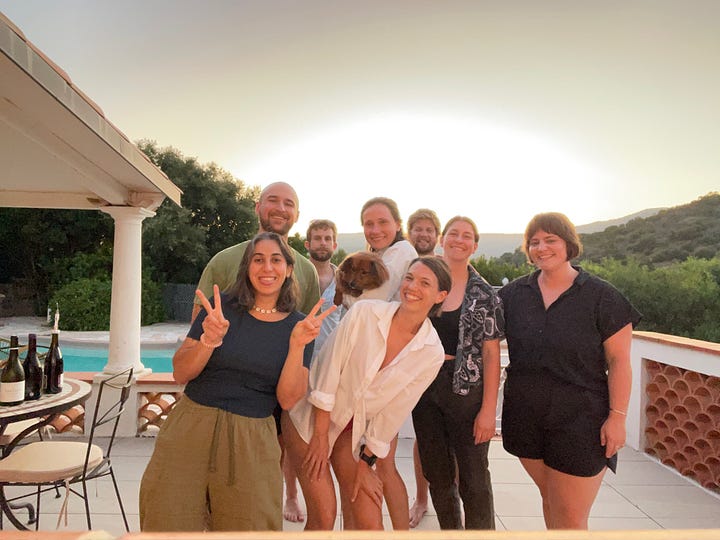
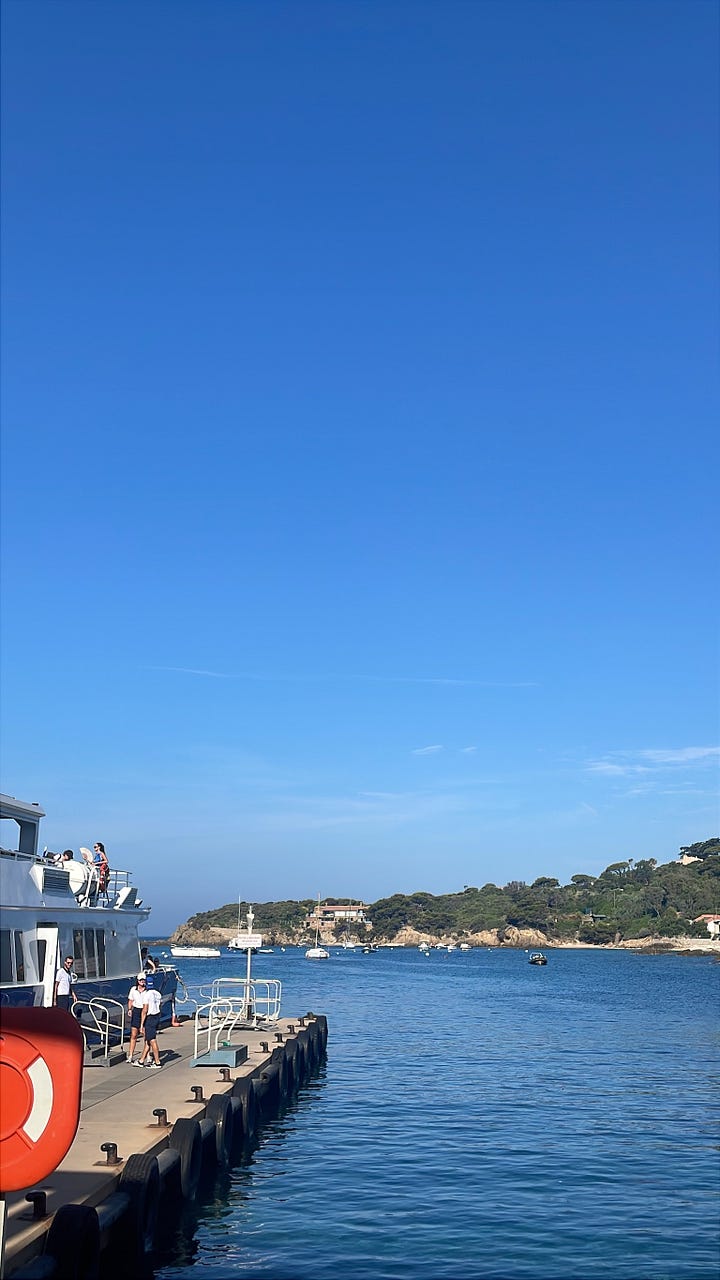
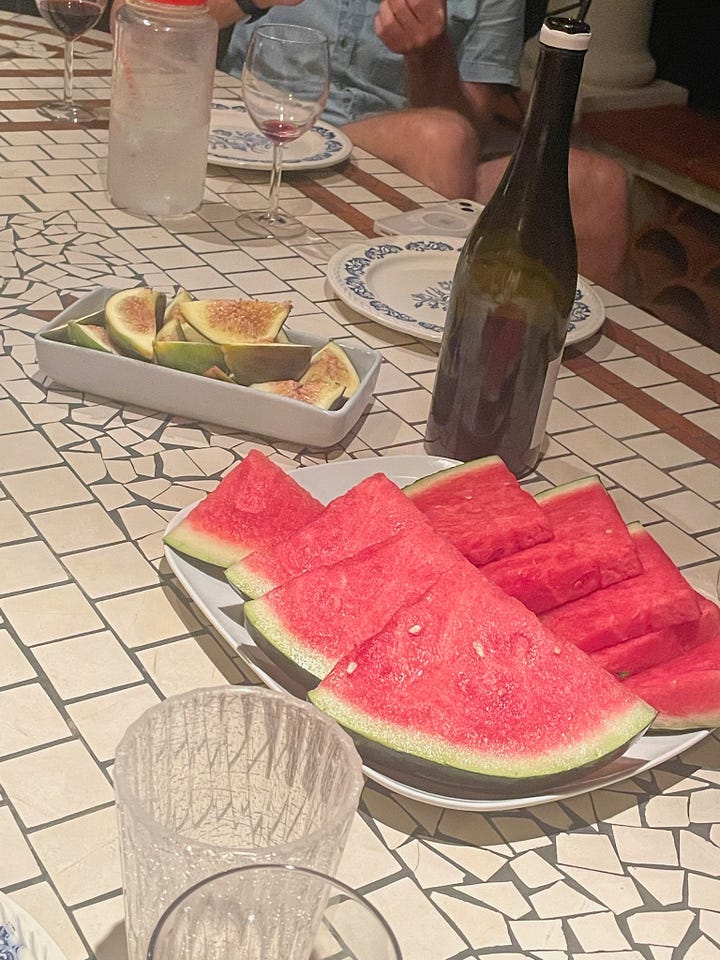
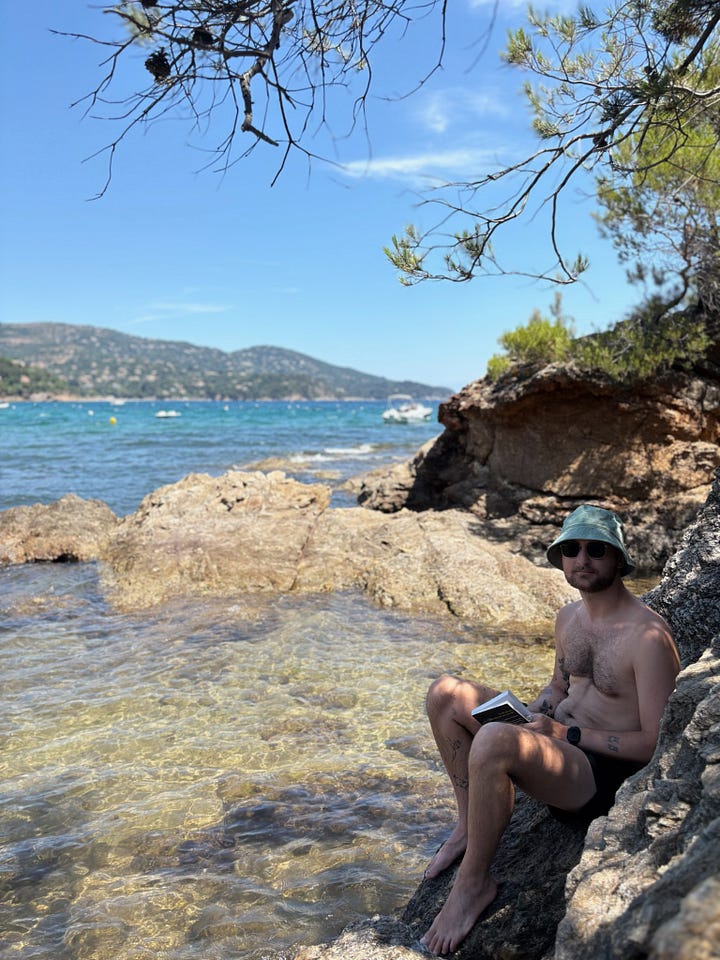
Thanks for reading. Did I mention that I’m feeling really good to be back and hitting my stride again? More to come this summer, both in the weekly free bits and the Prayer Circle series. I’ll keep payments off a little longer as I keep settling into things. Let me know what you like and what you’re curious to know more about. I haven’t been writing as much astrology here, but I do have some thoughts queued up for soon to be felt seasonal shifts, so, if that’s what you’re here for, your patience is about to be rewarded.
Some things:
Obviously the three books I mentioned. Another Country by James Baldwin, To the friend who did not save my life by Hervé Guibert, and Hold Everything Dear by John Berger. All worth reading and all surprisingly good summer reads.
This interview in Sojourner. It’s a little odd and I felt myself annoyed at points, but I was curious after learning nobigdyl. has been such a popular Tiny Desk Concert. Idk what that says about him, except that the “In this house we believe…” poster people he rolls his eyes at are probably big fans of his.
Rachel Cusk in the Paris Review some years ago (so sorry it’s paywalled! If you don’t have a subscription and want to read, reply to this email and I’m sure I can find a way to get it to you!). It was one of the last things I read in public before Covid-19 hit and it was somehow already hot enough in Texas that I was sitting in the sun at a brewery, recently freed (for the first time, not the last) from my job at a soulless consulting company, and it left an impression. Now I’m a little cooler on some of it than I was then (the only way to read?), but it’s still worth engaging I think.
Always a lot of credit goes to the people who have been my teachers, both directly and through their freely shared knowledge, and so many books.



